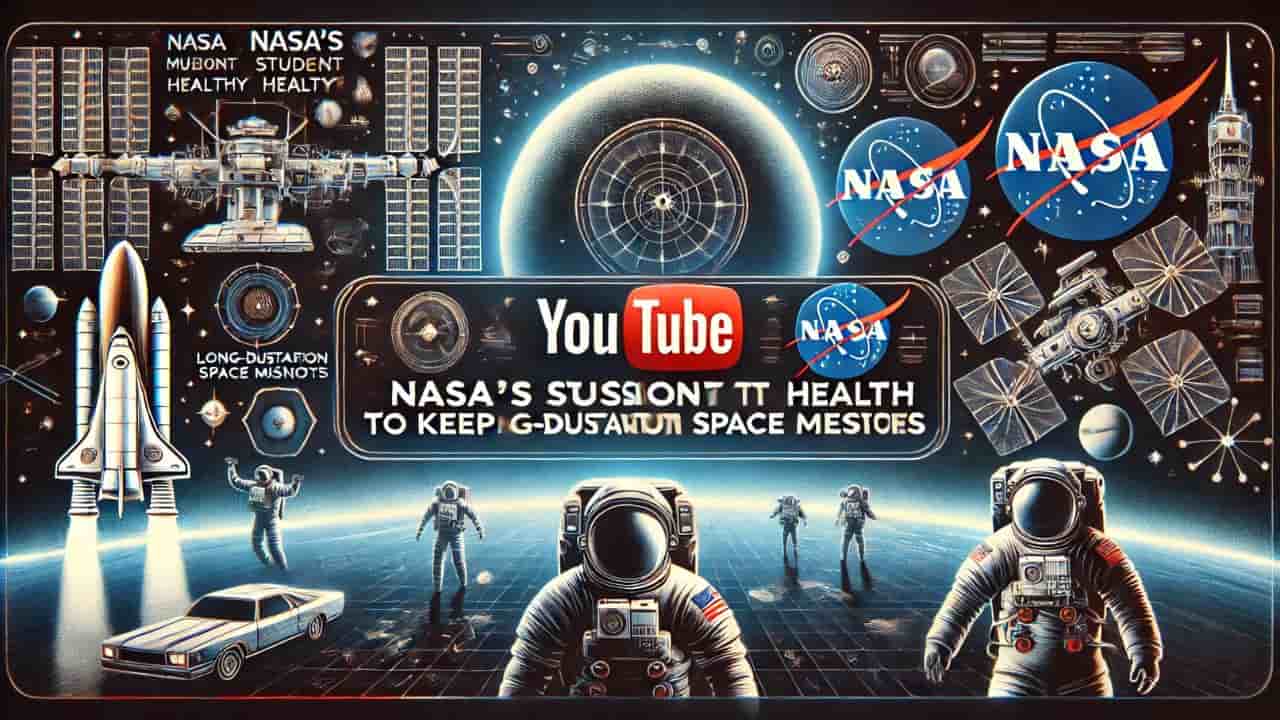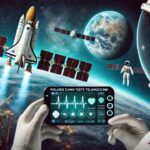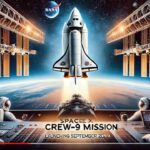NASA studies, astronaut health, long-duration missions, space exploration, astronaut performance, spaceflight risks, Moon mission, Mars mission, crew performance, space mission research
Explore how NASA’s latest research initiatives are enhancing astronaut health and performance on long-duration space missions. Discover the 11 groundbreaking studies aimed at addressing the physiological and psychological challenges of space exploration.

Understanding NASA’s Efforts to Support Astronaut Health on Long-Duration Missions
NASA has long been at the forefront of space exploration, continually pushing the boundaries of human capability and endurance. As the agency looks towards more ambitious goals, such as returning to the Moon and eventually sending humans to Mars, the health and performance of astronauts during long-duration space missions have become a critical focus. To this end, NASA is funding 11 new studies aimed at enhancing the well-being and effectiveness of crew members on these extended missions. These studies, which will be conducted on Earth, are designed to simulate the physical and mental challenges astronauts might face in space, providing valuable insights that will help NASA safeguard the health and performance of astronauts during future deep-space expeditions.
The Importance of Supporting Crew Health and Performance
Space is an incredibly harsh and unforgiving environment. The lack of gravity, exposure to radiation, and the isolation of being far from Earth all pose significant risks to the health and well-being of astronauts. NASA has recognized that addressing these risks is essential for the success of long-duration missions. By funding these 11 studies, NASA aims to explore various aspects of spaceflight that could impact crew performance, including physiological and psychological responses to the challenges of space travel.
The studies will focus on understanding how spaceflight affects team performance, communication, decision-making, and overall brain health. These factors are crucial for ensuring that astronauts can work effectively and make sound decisions in the demanding environment of space. By gaining a deeper understanding of these issues, NASA can develop strategies to mitigate the risks and enhance the safety and productivity of future missions.
The Selected Studies and Their Objectives
The 11 studies selected for funding were chosen from a pool of 123 proposals submitted in response to the 2024 Human Exploration Research Opportunities. The proposals were rigorously reviewed by subject matter experts from academia, industry, and government using a dual anonymous peer-review process. The selected studies, which come from 10 different institutions, will receive a cumulative award of approximately $14.6 million. The projects vary in duration, ranging from one to five years, and each study has a specific focus area related to the challenges of long-duration space missions.
Here is a closer look at some of the selected studies:
- Investigating Countermeasures for Communication Delays (Katya Arquilla, University of Colorado, Boulder): This study will explore ways to overcome the communication delays that occur during space missions. Communication delays can significantly impact team performance, particularly during critical operations. By developing countermeasures, the study aims to enhance communication and ensure that astronauts can effectively collaborate, even with delayed responses.
- CADMUS (Crew Adaptive Decision Making Under Stress) and Crew Decision Support System (Tripp Driskell, Florida Maxima Corporation): This project will focus on developing and validating a decision support system that helps astronauts make better decisions under stress. Space missions are inherently stressful, and the ability to make sound decisions in such conditions is vital for the success and safety of the crew.
- Predicting Operationally Meaningful Performance with Multivariate Biomarkers (Christopher Jones, University of Pennsylvania, Philadelphia): This study aims to use advanced algorithms to predict astronaut performance based on various biomarkers. By identifying the physiological and psychological indicators that correlate with performance, the study will help NASA better understand how to support crew members during long missions.
- Enhancing Performance and Communication for Distributed Teams During Lunar Spacewalks (Jessica Marquez, NASA Ames Research Center, Silicon Valley, California): This project will explore how to improve the performance and communication of teams during lunar spacewalks. Effective communication and teamwork are essential for the success of complex operations, such as spacewalks, and this study will provide valuable insights into how to optimize these aspects in the challenging environment of the Moon.
- Lessening the Impact of Interface Inconsistency Through Goal-Directed Crew Operations (Shu-Chieh Wu, San Jose State University Research Foundation, California): This study will investigate how inconsistencies in interfaces used by astronauts can impact their performance. By developing strategies to reduce these inconsistencies, the study aims to enhance the effectiveness of crew operations and reduce the likelihood of errors.
- Local Psychiatric Digital Phenotyping for Isolated, Constrained, and Extreme (ICE) Environments (Erika Rashka, Johns Hopkins University, Baltimore): This project will focus on using digital phenotyping to monitor and support the mental health of astronauts in isolated and extreme environments. Space missions can be mentally taxing, and this study aims to provide tools for early detection and intervention of psychiatric issues.
- Dose-response Curves of Cardiovascular and Ocular Variables During Graded Lower Body Negative Pressure in Microgravity Conditions (Ana Diaz Artiles, Texas A&M Engineering Experiment Station, College Station): This study will investigate how microgravity affects cardiovascular and ocular health. Understanding these effects is crucial for preventing health issues that could arise during long-duration missions.
- A Speech-Based Artificial Intelligence System for Predicting Team Functioning Degradation in HERA Missions (Theodora Chaspari, University of Colorado, Boulder): This project will develop an AI system that uses speech analysis to predict when team functioning might degrade. By identifying early signs of dysfunction, the system can help prevent issues from escalating, ensuring that teams remain cohesive and effective.
- Supporting Collaboration and Connectedness between Space and Ground at Lunar Latencies (Ute Fischer, Georgia Tech Research Corporation, Atlanta): This study will explore how to maintain strong collaboration and connectedness between astronauts in space and mission control on Earth, even with the communication delays inherent in lunar missions.
- Space Exposome Converges on Genotoxic Stress to Accelerate Brain Aging and Countermeasures to Mitigate Acute and Late Central Nervous System Risks (Xiaohong Lu, Louisiana State University, Shreveport): This project will investigate how the space environment affects brain health, with a focus on the potential for accelerated brain aging. By understanding these risks, the study aims to develop countermeasures to protect astronauts’ brain health during long missions.
- NeuroSTAR (Neurobehavioral Changes Following Stressors and Radiation): Predicting Mission Impacts from Analogous Human and Rodent Endpoints (Catherine Davis, Henry M. Jackson Foundation for the Advancement of Military Medicine, North Bethesda, Maryland): This study will explore how stressors and radiation in space affect neurobehavioral health. By studying both human and rodent models, the project aims to predict the impacts of these factors on astronauts and develop strategies to mitigate them.
The Broader Implications for Space Exploration
These studies represent a significant step forward in NASA’s ongoing efforts to support the health and performance of astronauts on long-duration missions. By addressing the various physiological and psychological challenges that astronauts may face, NASA is laying the groundwork for successful missions to the Moon, Mars, and beyond.
The knowledge gained from these studies will not only benefit future space missions but could also have broader applications here on Earth. For example, understanding how to mitigate the effects of isolation and stress could inform approaches to supporting individuals in remote or extreme environments on Earth. Similarly, advancements in AI and decision-making systems developed for space could have applications in other high-stakes fields, such as medicine or emergency response.
Conclusion
As NASA continues to push the boundaries of human exploration, the health and performance of astronauts remain a top priority. The 11 studies funded by NASA will provide valuable insights into how to best support crew members during long-duration missions, addressing both physiological and psychological challenges. By investing in this research, NASA is not only preparing for future missions to the Moon and Mars but also contributing to a deeper understanding of human health and performance in extreme environments. This research will help ensure that astronauts are well-equipped to face the challenges of space exploration, paving the way for the next generation of space missions.
Read More
- NASA Missy Elliott: Hip-Hop Song Beamed to Venus
- SpaceXs New Falcon 9 Booster Successfully Launches 22 Starlink Satellites Boosting Global Connectivity
- Everything You Need to Know About the Full Sturgeon Moon 2024 August Supermoon Viewing Guide
- NASA Citizen Scientists Discover Hypervelocity Star Zooming Out of the Milky Way










